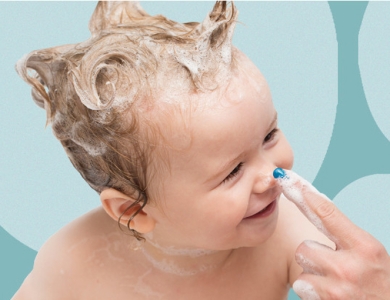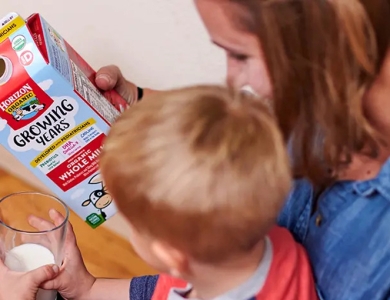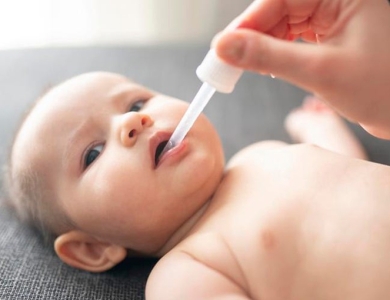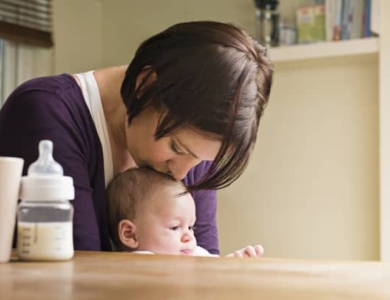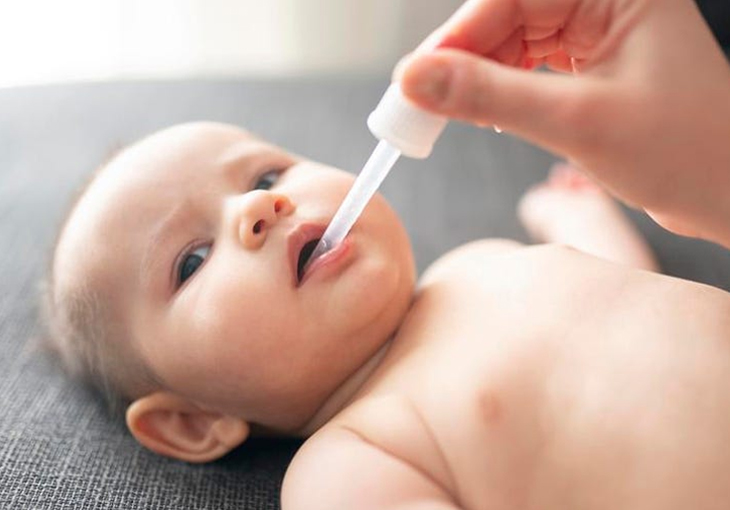
Of the many products available designed to ease the aches and pains of infanthood, baby probiotics, which aim to build a strong gut microbiome and ease gas pain, constipation and colic, are a popular choice.
But how do baby probiotics actually work, and does every baby need them? Here’s everything you need to know.
What Are Probiotics?
Probiotics are a widely available supplement not just for babies, but for adults as well. They’re live microorganisms touted as having health benefits when consumed or applied to the body, according to the National Center for Complementary and Integrative Health.
In general, probiotics create healthy bacteria in the digestive tract that can help digest food, destroy cells that cause disease or produce vitamins. Different types of probiotics have different strains, which have varying effects on the body, says Anthony Porto, a pediatrician at Yale New Haven Hospital in Greenwich, Connecticut and a Forbes Health 2021 Advisory Board member. The most common strains of probiotics in baby supplements include:
- Lactobacillus
- Saccharomyces
- Bifidobacterium
Probiotics are found in fermented foods like yogurt, kimchi and sauerkraut. While the amount of colony-forming units (or CFUs, which refers to the number of live and active microorganisms) provided for babies in probiotic supplements varies by type, according to Dr.. Porto, it’s typically within the billion range, which adds an extra gut health boost.
Benefits of Probiotic Supplements for Babies
There’s still a lot of research that needs to be done on giving probiotics to infants, says Carrie Kaufmann, a pediatric nurse practitioner at Stanford Children’s Health in Palo Alto, California, adding that she doesn’t see it as a necessary supplement for every baby.
There are some cases where a probiotic supplement may be beneficial, though, including:
If Your Baby Has Colic
“Colic is defined as three or more hours of crying per day on three or more days of the week for a period of three weeks in an otherwise healthy, well-fed infant,” says Kaufmann, adding that some research has found that probiotics may decrease crying duration in colicky babies.
If you’re looking to prevent colic in the first place, she adds, there’s no reason to give your baby a probiotic supplement—there is currently no evidence to support probiotic use as a helpful tool.
If You Want To Prevent Antibiotic-Associated Diarrhea
If your baby is on an antibiotic for any reason, diarrhea may be a side effect, and a probiotic might help, according to Kaufmann. “Based on findings, there seems to be an overall protective effect of probiotics in preventing antibiotic-associated diarrhea.”
In fact, a double blind, placebo-controlled study found that infants receiving probiotics had less episodes of diarrhea (37.5%) than the control group (80%)[1].
[1]: Jirapinyo P, Densupsoontorn N, Thamonsiri N, Wongarn R. Prevention of antibiotic-associated diarrhea in infants by probiotics. J Med Assoc Thai. 2002.85; 2:S739-42.
Your Baby Has Acute Gastroenteritis
Acute gastroenteritis is defined as diarrhea or vomiting (or both) that lasts more than seven days. You should always talk to your doctor if your baby is experiencing these symptoms, and there is some evidence that probiotics can help, according to Kaufmann. “The effect is that probiotics compete with enteric pathogens, there are then less nutrients for these pathogens, and probiotics increase immune response,” she says.
One systematic review of randomized, double-blind, placebo-controlled trials found that the use of probiotics compared with placebo was associated with a significantly lower risk of diarrhea lasting more than three days[2].
[2]: Szajewska H, Mrukowicz JZ. Probiotics in the treatment and prevention of acute infectious diarrhea in infants and children: a systematic review of published randomized, double-blind, placebo-controlled trials. J Pediatr Gastroenterol Nutr. 2001. 33;2:S17-25.
Your Baby Is in Daycare and You Want To Decrease Their Chance of Getting Sick
Babies and toddlers who are around other kids in a daycare setting tend to get sick more frequently than children who stay at home. If you want to decrease your baby’s chances of getting sick, Kaufmann says probiotics may help, citing a study that found a decrease in incidence of rhinopharyngitis (or the common cold) for children in daycare when they drank a fermented yogurt drink[3].
[3]: Prodeus A, Niborski V, Schrezenmeir J, Gorelov A, Shcherbina A, Rumyantsev A. Fermented Milk Consumption and Common Infections in Children Attending Day-Care Centers: A Randomized Trial. J Pediatr Gastroenterol Nutr. 2016;63(5):534-543.
Types of Probiotic Supplements for Babies
The number of probiotics products available for babies can feel overwhelming. Kaufmann, though, recommends the following:
BioGaia Protectis
- Probiotic strain/bacteria: Limosilactobacillus reuteri
- How it’s administered: Drops. For older kids, chewable tablets are available.
- Benefits: This probiotic is shown to help with colic, according to Kaufmann, and it contains vitamin D.
Gerber Soothe Probiotic Colic Drops
Probiotic strain/bacteria: Limosilactobacillus reuteri
- How it’s administered: Drops
- Benefits: These probiotic drops help support good bacteria in the digestive system and can be used to treat colic, according to Gerber.
Klaire Labs Ther-Biotic Infant Probiotic Powder
- Probiotic strain/bacteria: This product includes five billion individual bacteria, consisting of five lactobacillus and five bifidobacterium species.
- How it’s administered: As a powder that can be mixed with breast milk, formula or food.
- Benefits: This product can help support immune and gastrointestinal health, according to the company.
Pedia-Lax Probiotic Yums
- Probiotic strain/bacteria: Limosilactobacillus reuteri
- How it’s administered: This is a chewable tablet, and therefore is suitable for older kids.
- Benefits: The L. reuteri is a strain known to help with gut issues.
- Evivo B. Infantis
Probiotic strain/bacteria: B. Infantis
- How It’s administered: As a powder mixed with formula or breast milk
- Benefits: A study funded by Evolve BioSystems and published in BMC Pediatrics found that stools among babies given B. Infantis supplements were fewer and better formed compared to those who were not[4].
Side Effects of Probiotic Supplements for Babies
Always talk to your pediatrician before giving your little one any kind of supplement, including probiotics.
For the most part, Kaufmann says babies are unlikely to experience serious side effects from probiotics. That being said, there are some to look out for. These include:
Abdominal discomfort
- Diarrhea
- Nausea
- Vomiting
- Gassiness
- Bloating
If you notice that your baby is experiencing any of these side effects while taking probiotics, stop giving them the supplements and talk to your doctor.
Are Probiotic Supplements for Babies Safe?
Because probiotics are sold as an over-the-counter dietary supplement, they are not approved by the Food & Drug Administration (FDA). While they may not be beneficial for all babies, probiotic supplements are generally viewed as safe, says Dr. Porto.
“In healthy pediatric populations, probiotic administration is generally considered safe and tolerated, taking into account the strain, dosage and duration given,” adds Kaufmann. “Careful consideration should be taken with possible contraindication for preterm or very low birthweight infants, children with immunodeficiency, children on immune-compromising drugs or children with indwelling catheters or severe underlying disease.”


